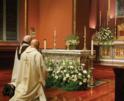
Faith
First of all, we should remember that priests and deacons are the ordinary ministers of Communion, with extraordinary ones reserved for true necessity.
After writing about mission and the call to holiness, I was asked to answer this question: "How did extraordinary ministers of holy communion become so ordinary? Did the Second Vatican Council call the laity to take up active participation through liturgical roles?"
Many people object to the use of extraordinary ministers for Communion because they have witnessed disrespect toward the Eucharist from them. For instance, as a 15-year-old altar boy at my parish in Pennsylvania, a Eucharistic minister approached me, saying, "The wine's out. Should I go fill it up from the fridge?" The rise in the use of extraordinary ministers has come with problems: lay ministers who are woefully unprepared to exercise this service, sometimes even without clear faith in the Lord's presence, who often do not dress appropriately for the role, and whose function has become overused.
On the other hand, Father Joseph Crowley reported that on March 5, 2023, at St. Thomas Church in Thomason, Connecticut, "One of our eucharistic ministers was running out of hosts, and suddenly there were more hosts in the ciborium. God just duplicated himself in the ciborium." The details have been investigated by the archdiocese and forwarded to Rome for consideration as a possible miracle. The alleged miracle reminds us that God wants us to come to him as he pours himself out so generously and vulnerably to us in the Eucharist. But we must also do our part in approaching him worthily and reverently.
First of all, we should remember that priests and deacons are the ordinary ministers of Communion, with extraordinary ones reserved for true necessity. Pope St. John Paul II, speaking in response to a lack of reverence in receiving Communion, reminded us:
"But one must not forget the primary office of priests, who have been consecrated by their ordination to represent Christ the Priest: for this reason, their hands, like their words and their will, have become the direct instruments of Christ. Through this fact, that is, as ministers of the Holy Eucharist, they have a primary responsibility for the sacred species, because it is a total responsibility: they offer the bread and wine, they consecrate it, and then distribute the sacred species to the participants in the assembly who wish to receive them. . . . How eloquent therefore, even if not of ancient custom, is the rite of the anointing of the hands in our Latin ordination, as though precisely for these hands a special grace and power of the Holy Spirit is necessary! To touch the sacred species and to distribute them with their own hands is a privilege of the ordained, one which indicates an active participation in the ministry of the Eucharist" ("Dominicae Cenae," 11).
Those called upon to assist the ordinary ministers should approach this weighty task only with sufficient preparation. The United States Bishops offer the following directives:
"Extraordinary Ministers of Holy Communion should receive sufficient spiritual, theological and practical preparation to fulfill their role with knowledge and reverence. In all matters they should follow the guidance of the diocesan bishop. . . . When recourse is had to Extraordinary Minister of Holy Communion, especially in the distribution of Holy Communion under both kinds, their number should not be increased beyond what is required for the orderly and reverent distribution of the Body and Blood of the Lord."
In general, all of us must overcome a nonchalant attitude toward the Eucharist, beginning to act like we are receiving the greatest gift imaginable. The Bible offers examples of the overpowering mystery and power of God's presence. The ark of the covenant contained only relics of the Exodus, yet touching it without permission led to the death of Uzzah (2 Sam 6). St. Paul, speaking of the Eucharist, which infinitely exceeds the ark, likewise cautions us: "For anyone who eats and drinks without discerning the body eats and drinks judgment upon himself. That is why many of you are weak and ill, and some have died. But if we judged ourselves truly, we should not be judged" (1 Cor 11:29-31). If we saw the Eucharist for what it is, we might be blinded by its glory, like Paul himself, who encountered the Lord on the road to Damascus. We certainly would prepare more seriously to enter his presence or assist in the liturgy in any way!
Likewise, when we enter the church, we should leave our desire for efficiency and entertainment at the door. We are not at Mass for ourselves but for God, to give him glory and to show him our love. We should be ready to slow down and adjust our expectations to focus on God more than ourselves. Mass does not have to conclude in less than an hour. We do not have to feel involved outwardly so long as we receive the Word and unite ourselves to Jesus's sacrifice to the Father, as this forms the heart of participation. We should never expect to receive the Lord on our terms but should surrender to his expectations. Communion is a gift that requires humility and preparation (particularly through Confession) and should be consciously accepted in love.
Finally, we should not confuse the laity's mission with an imitation of the priest's liturgical ministry. The liturgy is ordered toward mission, and the laity's mission is in the world. The task of serving as an extraordinary minister is more of an exception than a model for lay mission. The Eucharist transforms us within, making Christ live in us ever more. Our mission, therefore, stems from bringing his presence into the world so it, too, may be transformed by him. The Second Vatican Council's decree on the laity explains: "[The laity] exercise the apostolate . . . [by] penetrating and perfecting of the temporal order through the spirit of the Gospel. . . . Since the laity, in accordance with their state of life, live in the midst of the world and its concerns, they are called by God to exercise their apostolate in the world like leaven, with the ardor of the spirit of Christ." ("Apostolicam Actuositatem," 2).
The distinct mission of the laity does not focus on taking a lead within the liturgy but on leading within the world with the grace God gives us through the liturgy.
Comments
Comments Policy
Recent articles in the Faith & Family section
-
Should general absolution be a more regular practice?Jenna Marie Cooper
-
The Eucharist and the mission of the laity: The case of extraordinary ministersDr. R. Jared Staudt
-
The rest of Ordinary TimeLucia A. Silecchia
-
Liturgical environmentFather Robert M. O'Grady
-
Where Did You See the Face of Christ Today?Maureen Crowley Heil


















